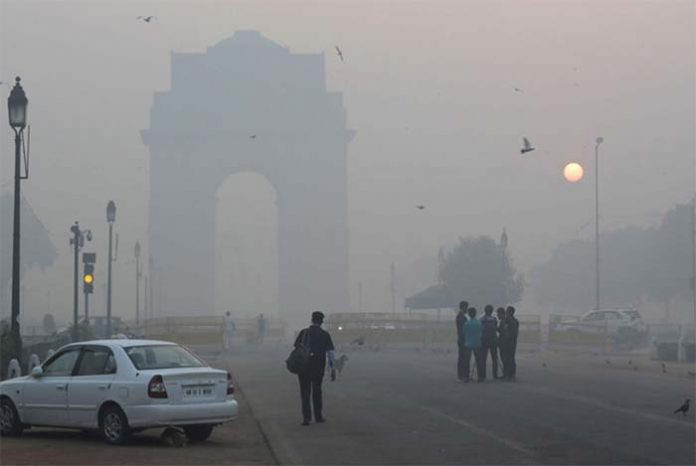- India ranked 168 out of 180 countries
- Air pollution alone caused 16.7 lakh deaths in India
National capital, New Delhi, has been witnessing, yet again now, hazardous level of air quality for the tenth consecutive season. This time even Covid-19 calamity has made no difference. As if there is nothing the country could do about it and reminding that rhetoric make no difference. After Mumbai has gone through the fury this rainy season yet again, it is the turn of Hyderabad this time. The number of cities witnessing a similar situation for almost similar known reasons is on increase and there is no sight of significant change in the response. What does this all imply?
India, the fourth-worst country
No wonder the global “Environment Performance Index” has ranked India in 2020,for the fifth consecutive year, as “fourth-worst country” at 168 out of 180 countries assessed by two premier US academic institutes backed by two global economic forums. This was designed as per environmental targets set forth in the UN Millennium Development Goals. In 2006 India was ranked at 118 in the same Index. The decline in the performance since has been marked. What has been our response to such a standing? What specific correctives could be referred during the last decade or more? It is not just this study, a 2020 report on “State of Global Air” stated that air pollution alone had caused 16.7 lac deaths in the year and responsible for 21 percent of all neonatal deaths in India. Water pollution is already known as disastrous slow poison, both in urban and rural.
Water is a national problem and known as for much longer. And yet what have we pursued and what has been the result? We could not even pursue rain water harvesting or supply portable water even in river-bed cities. What difference the stories about decline of rivers and water sources over the decades have made? Or of piling up of garbage or crumbling sewage system, no longer confined to cities. But, In the meanwhile, “mineral water” has become a big business under the patronage of successive governments and it has now become a kind of necessity, no longer a lifestyle phenomenon of rich and poor and in urban and rural. Forecast of a bigger threat looming large on account of water scarcity or air pollution is yet to provoke us.
Privatising forests in Madhya Pradesh?
While Chhattisgarh is rediscovering conservation with long-term environmental plans by regenerating forest areas with low price schemes, the neighbouring Madhya Pradesh is considering getting out of responsibility from India’s second largest forests to privatise and hand over to industry. What is amazing and amusing is the justification for such a policy in making. The official note inviting the industry for a discussion (October 2020) states that Government expects private Industry to do a “professional job” with the help of technology and give more job opportunities. It comes to the conclusion that the government no longer can find funds required. But It thinks that private Industry will play a “significant role in bringing about innovation in the forest sector and increase the productivity of forest areas” – better than what the hundred-year-old professional forest services, acclaimed otherwise, is doing. The note further states that “the participation of private investors in forest areas will reduce dependence of local communities on government funds and communities will get opportunity to become self-sufficient”. All that without consulting even the local public first. Thanks to Forest Rights Act of 2006, the states cannot proceed without the Union government bringing out an Amendment or notification.
And such Amendments or notifications of late have become routine. The power of industry’s lobby (in this case of cement, paper and pulp) can even make the governments go to such ridiculous extent, how corporates can dilute laws to distract and derail or delay unfavourable legislations is being reminded now. An analysis of Amendments to notify changes in the legislations brings out their powers whether it is on plastic, forests, air or water. And, to facilitate such goings, environment issues are most under-reported by the news media.
Senior academics, scientists react
Take another 2020 example of government coming up with a notification which amounts to “dismantling environmental safeguards” in the name of promoting “ease of doing business”. Taking advantage of the Covid, the Union Government tried to issue an environment impact assessment notification (March-August 2020). But within few days, an unprecedented number of scientists, professionals and activists from across the country wrote to the Ministry to withdraw it and strengthen the existing EIA notification of 2006. 500 senior academic and scientific institutes from more than 160 premier institutes like the Indian institute of science, Indian Institute of Technologies, Indian Institutes of Managements and universities wrote to the Ministry. Then there were more than a million e-mails by larger public. All this because the government wanted to exempt certain industries from the mandatory impact assessment. Even the minister tried to rush through brushing aside the officials of the Ministry. And yet there was hardly any coverage in the mainstream news media as they are busy with continued hyping of death of a cinema hero or bravo of an actress. Such being the examples no wonder India is being consistently ranked so low in the environmental performance as well as on Index of Democracy for the year 2020, the Swedish agency even said that India is “on a path of steep decline”.
What does this all bring out? Are we learning or leaning? Is this lack of understanding of the gravity of the situation or is this a failure to address compelling situations or manage implementation? What else explains? By going beyond and behind all these factors it becomes evident that it is party politics and political priorities which are responsible for the damning trend. With a dozen amendments a week from the Parliament becoming easy, this process has gained ground and implementation has become secondary.




